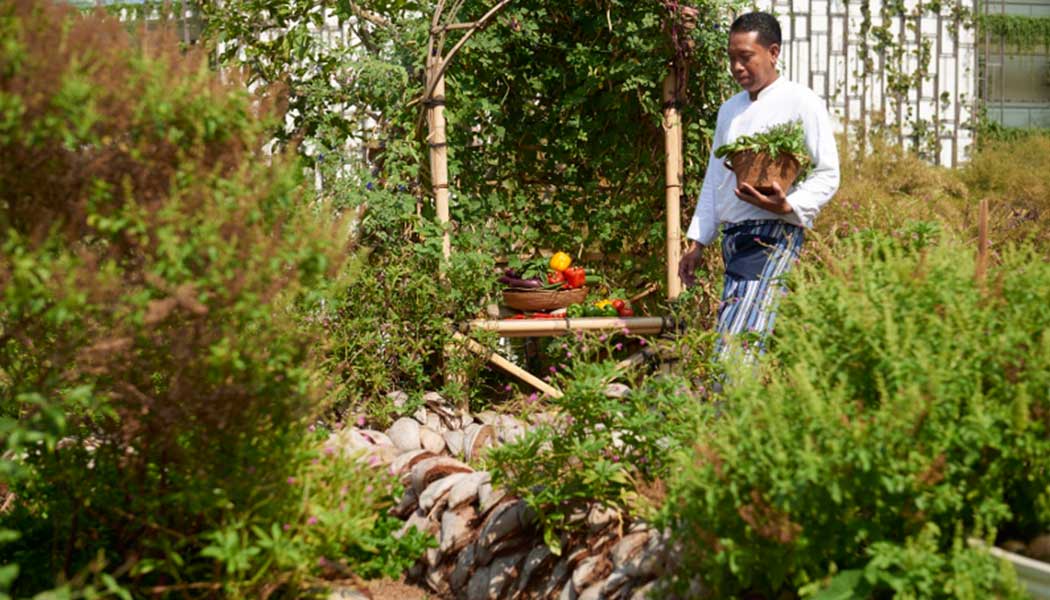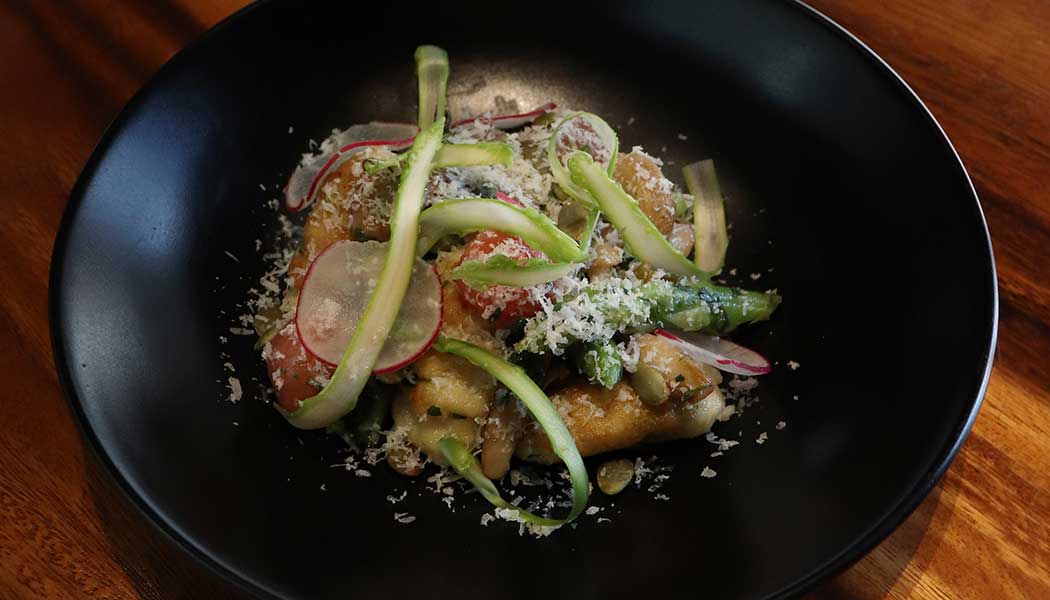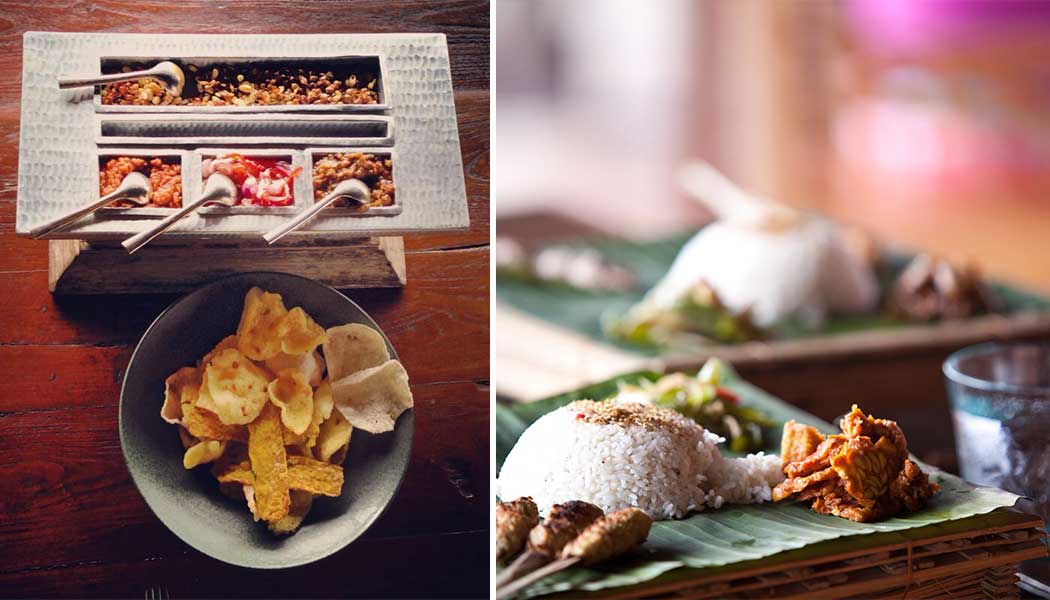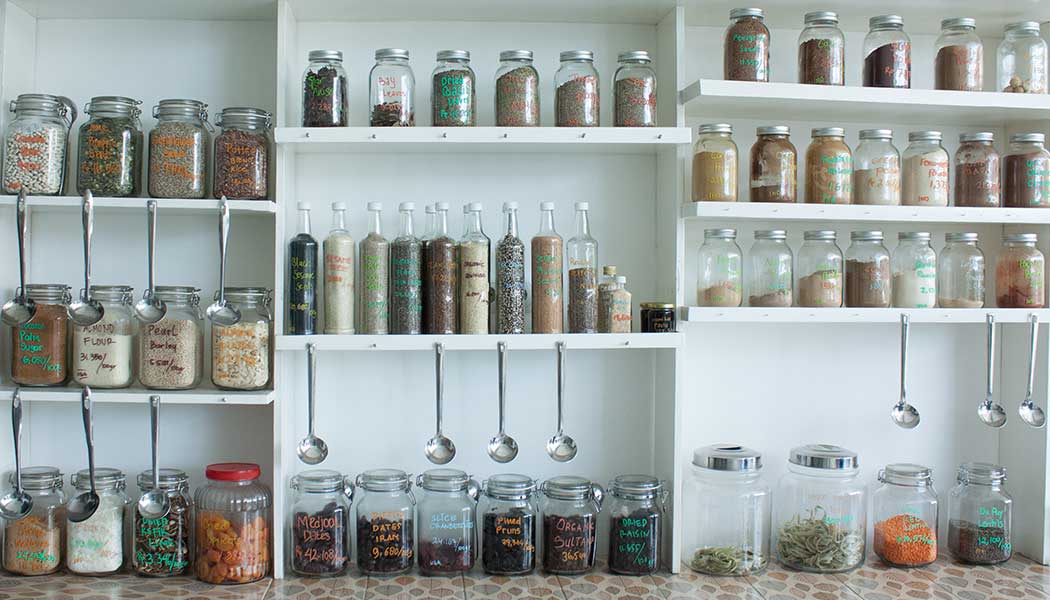The Yak sought out six of the most environmentally aware restaurants on the island.
1. IJEN AT POTATO HEAD
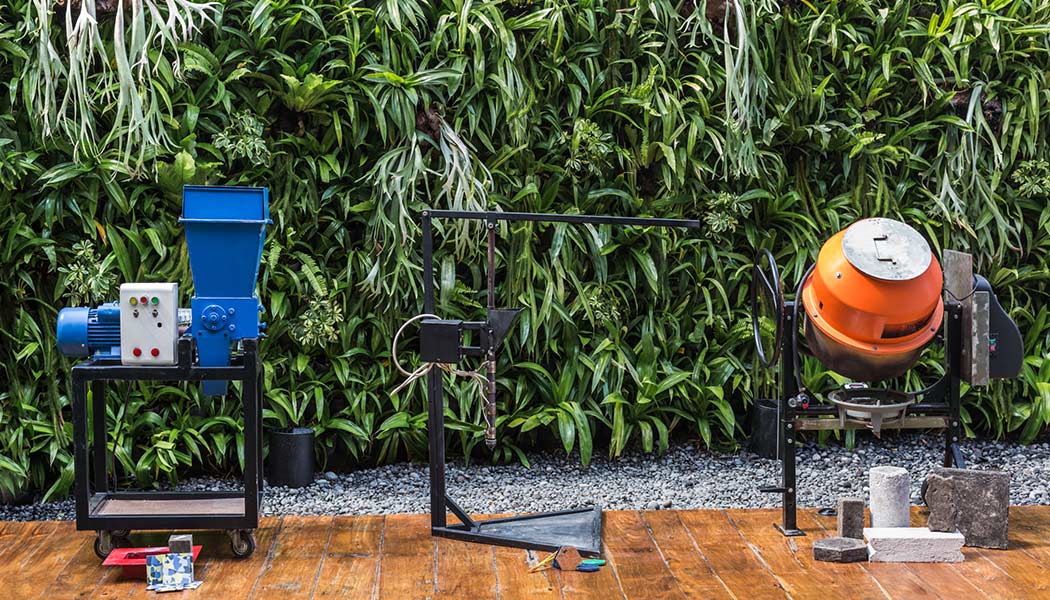
Potato Head has spearheaded a range of eco initiatives, including the use of a million hand-made bricks to build their hotel Katamama, hosting eco festivals and promoting a range of eco warriors. Their no-waste restaurant Ijen is the tip of the Iceberg for this modern group. Ijen strives for zero waste at their atmospheric seafood restaurant located on the heart of the iconic beach club. Dedicated to sustainable line-caught seafood, served on banana leaves and cooked over wood fires, they strive to find new ways to use their leftovers. Restaurants have long done this but packaging and kitchen waste continue to pile up. Potato Head will not accept deliveries in plastic, their leftover rice is used to make their own rice crackers, vegetables are pickled and preserved and turned into sambals. The downside is that certain items may not be available on the night you are dining; the upside is that there is always a range of nightly specials.
Tel: +62 361 4737979 www.ptthead.com/bali
2. GIVE CAFE
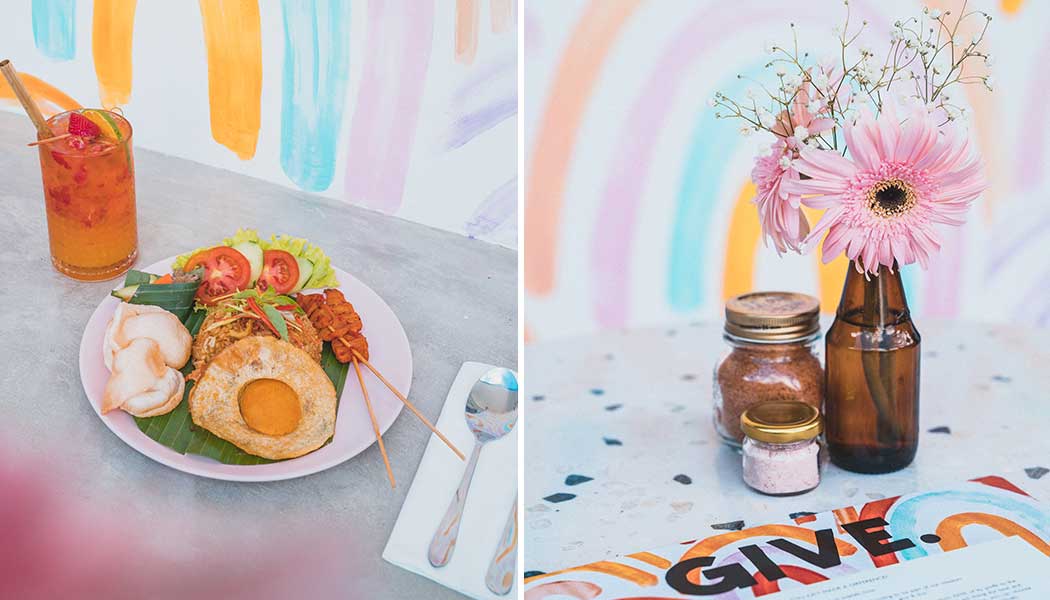
Going above and beyond their commitment to the planet and the island they love, the vegan menus from KYND Café have given rise to a concept that is as mindful as it is generous. The girls behind KYND, the delightful and popular vegan café in Petitenget, have traded on their success story at GIVE café to literally give back. The simple, and simply delicious, plant-based food and drinks on the menu sustain communities through their not-for-profit business model. All profits are given to three charities they choose, changing monthly to spread the love. They strongly believe that when you have more than you need you ‘ build a longer table, not a higher fence’.
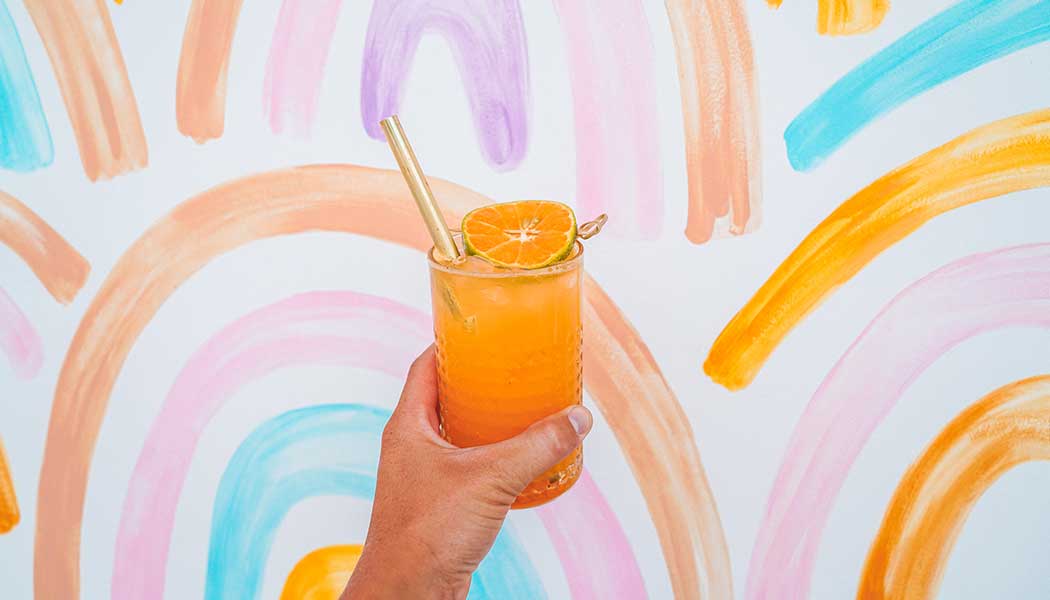
The food is as fresh, healthy and delicious as KYND café yet here, each purchase has a purpose; to give back to the island that sustains them. In their first four months of operating, they were able to give over Rp12 million to the planet, over Rp13 million to animal charities and over Rp14 million to charities that support communities. That’s an average of more than Rp10 million per month given to local charities. Best of all, they aren’t scrimping on the menu; it’s well worth visiting for the food and the knowledge that every bite is a donation. Needless to say with this attitude to giving back, plastic is not an option and waste is a dirty word.
Tel: +62 854 42861236 www.givecafe.org
3. ALILA HOTELS ZERO WASTE
With four stunning hotels and resorts in Bali, Alila announced in 2017 their ‘ Zero Waste to Landfill Project’. This commitment to the environment extends beyond their restaurants and includes collecting rainwater, composting, mulching cardboard, converting waste into fuel for hotel lamps and crushing glass to be used in building blocks. They also work with local communities to share their expertise and reduce the human impact on the island.
Each resort extends this philosophy to their kitchens, their staff and their suppliers. The result is a five-star experience that does no harm. Increasingly big name hotels and influential restaurant groups are doing their bit to reduce waste, encourage recycling and educate their staff and the villages that surround them. This includes their ‘Gift to Share’ Program that encourages guests to donate any amount they choose to the local community efforts that are initiated by the hotel or resort. Suddenly hanging out at the Beach bar at Alila Seminyak, dining at the seaside restaurant or heading into the hills to enjoy the gentle hospitality at the Ubud resort becomes more than a delicious experience.
4. W BALI
Yet another luxurious resort that has taken it’s environmental impact into consideration is the W Bali in Seminyak. With an Executive Chef firmly committed to zero waste in his kitchens, dining at W is not only a delicious experience it is also a masterful and creative approach to eliminating kitchen waste.
In a resort as large as this, it is an accomplishment. W has also hosted some of the world’s leading chefs who are promoting zero waste, check in to their events calendar to see who is coming up next, it’s been an eye-opening experience that even extends to the cocktails served at the resort. The latest initiative, as part of Bali’s Biggest Clean Up 2019 was the erection of a giant metal fish, named Goby, where guests and the public are encouraged to collect their plastic for recycling. It’s a work of art that shines a light on a problem being battled in every village and city across the globe.
Tel: +62 361 3000106 www.wbaliseminyak.com

5. BALI ASLI
Bamboo plates and drinking vessels, real cutlery and re-useable napkins are just the beginning of this story, which reads like a Balinese love affair of the culinary persuasion. Following on from a career in some very high profile cafes, restaurants and five-star hotels, Australian-born Chef, Penny Williams decided to get real and Bali Asli was born in the mountains beyond Candi Dasa. Asli in Balinese means original, and Bali Asli is as authentic as you can get.
Eschewing modern appliances and dumbed down recipes, this is going back to the roots of Balinese food. With a totally local list of ingredients, mostly from the region directly surrounding Bali Asli, the stoves are fired by wood, cooking utensils are the same as those used in an original home kitchen and the dishes are based on authentic Balinese recipes. Penny also runs a cooking school at Bali Asli, which includes heading out to local markets, buying fresh seafood from the fishermen who caught it, walking through the fields to forage for fresh herbs and local vegetables. And while it may be rustic, the incredible views of nearby Mount Agung are astonishing and the open-air restaurant is spacious and beautiful.
Tel: +62 822 36909215 www.baliasli.com
6. ZERO WASTE BALI AND MINI MUNCHER
Mini Muncher was just the beginning for this unassuming eco-warrior. Silvija Rumiha moved to Bali with her family in 2011 and began a journey that has impacted many of us. Her first business was Mini Muncher, based on the recipes she created for her own children. Having access to organic, homemade baby food and children’s meals proved popular with both locals and tourists.
The next move was opening Zero Waste Bali, her Umalas store that promotes a totally waste-free lifestyle, followed by her second store in Ubud. Silvija’s approach is simple; bulk containers dispense food, detergents and personal hygiene products in re-usable containers that can be returned and refilled or simply passed on to a new user. Cutting out the packaging and selling affordable chemical free products is a small step perhaps but one that has had a big impact. Her philosophy of sharing includes a range of her own delicious recipes that are featured on her website and social media. Silvija’s husband Bruce is on the management team at Ku De Ta, who has also used her influence to ban plastic at the beautiful beach club, which extends to their staff and suppliers.
Silvijas’s commitment extends to her own home where she strives to teach her children the value of memories over things. She walks the talk including cleaning her home with non-chemical detergents, cooking healthy wholesome meals and recycling every possible thing to reduce waste.
Tel: +62 878 62305959 www.zerowastebali.com www.minimuncher.com
Do you love our Big Six column? Check out more of the best restaurants in Bali here.
